Help dogs trapped in the cruel dog meat trade.
Humane Society International
Humane Society International
Help dogs trapped in the cruel dog meat trade.
Humane Society International / Global
Join us in fighting the cruel confinement of farm animals.
Humane Society International
Suspend the import and selling of horsemeat, which doesn’t meet EU food safety standards.
Humane Society International / Viet Nam

Participants take part at HSI’s farm animal roundtable in Vietnam. Trang Dang
In a pioneering effort by Vietnam’s food industry, representatives from some of the leading food service and hospitality companies around the world met today with Vietnamese egg and pork producers interested in supplying higher welfare cage-free eggs and crate-free pork. Humane Society International, in partnership with Nong Lam University, hosted the roundtable to discuss the growing shift in Vietnam’s food sector towards higher animal welfare products.
The roundtable, which took place at the Pullman Saigon Centre in Ho Chi Minh City, brought together Accor Hotels, Sodexo and Marriott International, along with government officials, and egg and pork farmers from Tien Giang province. In response to consumer concerns about the treatment of animals, a growing number of food companies are ending the caged confinement hens and breeding pigs from their supply chains globally, including in Vietnam.
Trang Dang, HSI Vietnam campaign manager for farm animals, said: “We’re excited to bring together food service providers, restaurants, hospitality chains, egg producers and government officials to plan the transition to cage-free eggs and crate-free pork in Vietnam. This is the first step towards improving the welfare of millions of animals raised for food in the country, and we look forward to engaging more stakeholders in the food industry in this effort moving forward.”
Dr. Nguyen Quang Thieu, Associate Dean of the Faculty of Animal Science and Veterinary Medicine from Nong Lam University issued the following statement: “As a part of the university goals and mission, we aim to educate students with knowledge on animal welfare as they will become the future of Vietnam’s agriculture industry. We’re glad to partner with Humane Society International on this informative workshop, which is a great initial on spreading animal welfare to the public.”
In Vietnam and around the world, breeding sows are often confined for most of their lives in gestation crates, individual metal cages barely larger than their bodies, preventing them from turning around and taking more than a few steps forward and backward. Egg-laying hens also spend their entire lives confined in wire battery cages, so small that they cannot even fully spread their wings. Science confirms what common sense tells us: the lack of space and restriction of movement is detrimental to the physical health of these animals and causes enormous frustration and suffering.
However, advocates for better animal welfare are making progress around the world. The use of conventional battery cages for laying hens is banned or being phased out under laws or regulations throughout the EU, in five U.S. states, in New Zealand, Bhutan and in the Australian Capital Territory. Officials in the majority of states in India, the world’s third largest egg producer, have declared that the use of battery cages violates the country’s animal welfare legislation, and the country is debating a national ban.
Media contact:
In Vietnam: Trang Dang, Trangd@humanesociety.org
In the U.S.: Raul Arce-Contreras, rcontreras@humanesociety.org, +1 301-721-6440
Humane Society International / Viet Nam

The free-range egg farm at Six Senses Ninh Van Bay
Humane Society International/Vietnam praised Six Senses Ninh Van Bay for becoming the first resort in Vietnam to have its own free-range egg farm. The resort’s farm will help its customers learn about a more humane alternative to intensive confinement egg production.
The new egg farm provides the hens with a quality of life well above that experienced by most laying hens in Vietnam. The majority of egg-laying hens in the country spend their lives crowded into small wire cages, known as battery cages, which do not give the birds sufficient space to walk or even stretch their wings.
Ngoc Nguyen, sustainability supervisor for Six Senses Ninh Van Bay, said, “Six Senses Ninh Van Bay aims to provide the highest quality experience to our guests, and our new free-range egg farm is one way we do this. Not only do we believe the quality of the food is enhanced when hens are given space to roam, but our guests will appreciate Six Senses respecting nature by providing a place for hens to perform their natural behaviors.”
At Six Senses Ninh Van Bay, the chickens on their farm can move about freely within a large yard or take cover in a spacious indoor enclosure, and can engage in natural behavior such as foraging outdoors, perching and nesting.
Trang Dang, HSI’s campaign manager for farm animals in Vietnam, said, “We urge consumers to do more research on the origins of their eggs, and avoid purchasing eggs produced in farms that use battery cages. By promoting the concept of free-range eggs, the resort provides valuable information to their guests so they can make a better choice for animals.”
The resort also adopts “Green Monday Vietnam”, a program that encourages their guests to eliminate meat once a week, on Monday, and opt for other delicious, healthy plant-based options. This is a part of a global movement supported by HSI that aims to promote a healthier, more sustainable and more compassionate community.
HSI works with governments, farmers, and other stakeholders in the egg, meat, and dairy sectors to end the extreme confinement of animals in cages and crates, and improve the overall welfare of farm animals. We can all stand up for animals every time we sit down to eat by reducing the number of animal products we eat, replacing them with plant based products or animal products from sources that adhere to higher animal welfare standards when possible.
Facts:
Humane Society International
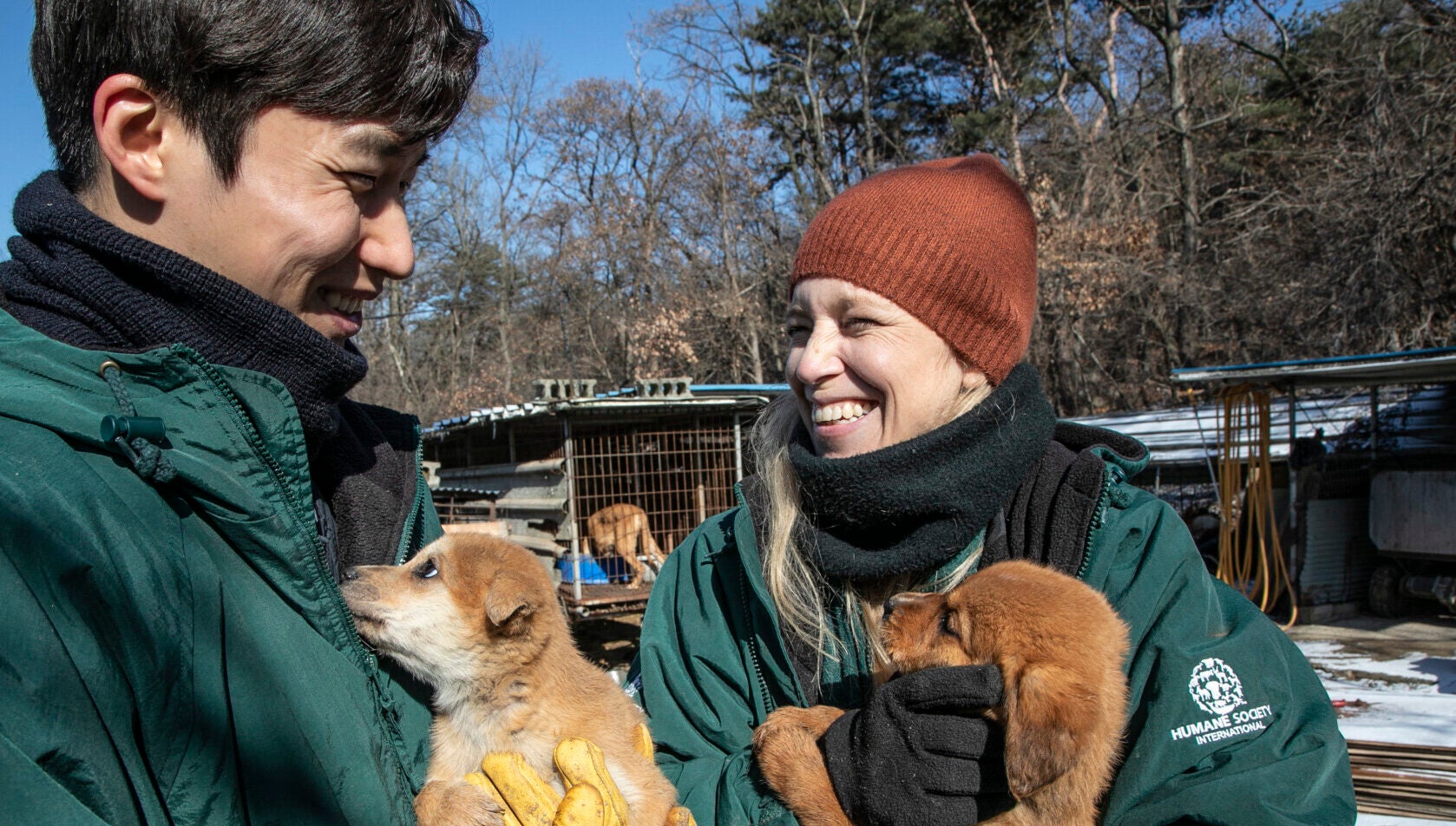
South Korea is the only known country in the world where dogs are routinely and intensively farmed for human consumption. Up to a million dogs are kept in thousands of facilities, left exposed to the elements in small, barren, filthy cages and given little food. Many suffer from disease and malnutrition and all are subjected to terrible, daily neglect. The methods used to kill the dogs are brutal—electrocution is most common. They are slaughtered in full view of other dogs, and their final moments are painful and terrifying.
Our ultimate goal is a ban on the dog meat industry, and our dog meat farm closures are part of a strategy to create the right political and societal circumstances to make this possible. One of the critical factors in achieving political support is showing that the dog meat industry can be successfully phased out in cooperation instead of conflict with the dog meat farmers, so we are working together with those who are eager to leave the dog meat industry to shut down their operations and transition to humane livelihoods.
Although some of the dogs we have rescued have found loving homes in South Korea, most have been flown to the United States, Canada, the United Kingdom, Canada and the Netherlands because, at present in South Korea, there is insufficient widespread acceptance of dog adoption, particularly for large-size dogs. There is also a misconception among some that “meat dogs” are different from “pet dogs,” a view that we are helping to change through public education and our many adoption stories that clearly show this is not the case.
Farm closure one took place in January 2015; HSI managed the rescue of the farmer’s 23 dogs, closed his dog farming operation and supported his switch to a full-scale blueberry farm. All 23 dogs were flown to the United States, divided among five Washington D.C. area shelters, and have been adopted into loving homes as family pets. Many of them act as ambassadors for our campaign.
Farm closure two took place in March 2015 in Hongseong, this time rescuing all 60 dogs—a mixture of breeds including beagles, poodles, Korean Jindos and large Tosas. Once again, the farmer ended dog meat farming for good. Tae Hyung Lee had bred dogs for meat for 20 years; facing criticism from family members for his participation in this trade, he was eager to work with HSI to close his farm and start a new business. All but two of the 60 dogs now live in the United States, in loving, caring environments, with two (a mother and pup poodle) happily adopted in South Korea.
Farm closure three in September 2015 was our largest yet, rescuing all 123 dogs from a farm in Chungcheongnam-do. All 123 dogs—a mixture of breeds ranging from the large mastiffs most often considered as “meat dogs” in South Korea, to Jindo mixes, Spaniel mixes and Chihuahuas—were transported to shelters in California, Oregon and Washington State in the United States.
Farm closure four was in December 2015, rescuing 27 dogs and puppies from a small “starter” dog meat farm in South Korea. The dogs were flown to the United States and divided among five area shelters for care and adoption.
Farm closure five: This was a rescue conducted in two parts, in total rescuing 267 dogs. Part one took place in February 2016, rescuing 50 dogs from a dog meat farm in Wonju; part two took place in April 2016, rescuing the remaining 217 dogs. The dogs from this farm are a mixture of breeds including Husky, Labrador, Golden Retriever, Mastiff and Jindo mixes.
Chicken Farm Dog Rescue: In July 2016, Humane Society International worked with Free Korean Dogs to assist a local activist called Jinoak in South Korea with re-homing dogs who had been rescued from a dog meat farm. Jinoak had discovered the dog meat farm containing 51 dogs, bought them from the farmer, and built a shelter to house the dogs. With assistance from Free Korean Dogs, Jinoak placed some of the dogs for adoption, and HSI stepped in to help re-home the remaining dogs. One of HSI’s Shelter and Rescue Partners in Helena, Montana, in the United States—Lewis and Clark Humane Society—agreed to take the dogs. One dog found an adopter online and was flown directly to Toronto to his new home.
Jeonju Farm Dog Rescue: In September 2016, HSI worked again with Free Korean Dogs to rescue 31 dogs from a dog meat farm after Korean authorities ordered the farm to shut down for operating illegally without a license. HSI assisted with re-homing five of the dogs.
Farm closure six: In January 2017, HSI closed down a farm in Wonju and rescued all 219 dogs, flown to the United States, Canada and the United Kingdom for adoption. The farmer, a mother with a teenage daughter, was keen to leave the trade and move to the city to start a better life for herself and her child.
Farm closure seven: In March 2017, HSI closed down a farm in Goyang and rescued all 67 dogs, flown to the United States for adoption. The elderly farmer and his wife were keen to retire due to age, ill health and their increasing unease at breeding dogs for eating—in fact the farmer had stopped selling his dogs for slaughter and stopped eating dog himself.
Farm closure eight: In June 2017, 16 dogs were rescued by HSI from a small backyard breeding operation in Seongnam (total includes two puppies born to one of the mama dogs shortly after we rescued her). The owner bred the dogs to sell to a nearby dog meat market. The dogs will all find forever homes in the United States.
Farm closure nine: In July 2017, HSI closed down a dog farm in Yesan and rescued all 149 dogs from the property, including 14 newborn pups, all of whom were flown for adoption to the United States.
Gongju city farm rescue: In October 2017, HSI/Korea assisted Korean animal partners KAWA in rescuing 23 dogs, mainly Tosas, from a farm in Gongju city.
Farm closure 10: In November/December 2017, HSI closed down a dog meat farm in Namyangju with more than 170 dogs, who were flown to the United States, Canada and the United Kingdom to find new homes.
Farm closure 11: In March 2018, HSI closed down a small dog meat farm in Gyeonggi-do province, with 105 dogs and puppies flown to Canada.
Farm closure 12: In June 2018, HSI reached an agreement with a farmer in Namyangju-si, Gyeonggi-do to remove the last 50 dogs from his dog meat farm before he shut it down to expand his more profitable water parsley business. We flew the dogs to Canada to start their new lives.
Farm closure 13: In October, 2018, we worked with Farmer Lee in Gyeonggi-do, South Korea to shut down his dog meat farm after 14 years, rescuing 200 dogs and flying them to Shelter and Rescue Partners in the United States, Canada, the United Kingdom and the Netherlands. Lee plans to expand his medicinal herb farm instead.
Farm closure 14: In February 2019, HSI closed a dog farm in Hongcheon with nearly 200 dogs, including a combined puppy mill operation.
Gupo dog meat market rescue: In July 2019, HSI/Korea worked with Korean partners KAWA, KARA and Busan Korean Alliance for Prevention of Cruelty to Animals, and alongside local authorities to rescue 85 dogs from Gupo dog meat market in Busan upon its closure.
Farm closure 15: In September 2019, HSI closed down a dog farm in Gyeonggi-do with more than 90 dogs and puppies.
Farm closure 16: In May 2020, HSI closed down a dog farm in Hongseong-gun, rescuing more than 70 dogs and puppies.
Farm closure 17: In October 2020, HSI shuttered a dog meat farm in Haemi and saved 170+ dogs from the dog meat trade.
Paju rescue: In October 2020, HSI/Korea assisted local groups with the rescue of 14 Jindo dogs from a small farm which the farmer had agreed to close.
Gimpo rescue: In December 2020, HSI/Korea assisted Korean partners LIFE and regional officials in rescuing more than 100 poodles, Jindos, Yorkshire terriers, Chihuahuas, Shih Tzus, Pomeranians, Spitz, Schnauzers and more caged in deplorable conditions on a junkyard farm where they had been bred and sold for both the pet trade and the dog meat trade.
Yongin rescue: In April 2021, HSI/Korea joined with Korean animal protection groups LIFE, KoreanK9Rescue and Yongin Animal Care Association to save 50 dogs from being euthanized on a dog meat farm in Yongin city after the facility was closed down by the authorities.
Jindo Island farm closure: In August 2021, HSI/Korea assisted our Korean partners LIFE to rescue 65 Jindo dogs and puppies from a farm on Jindo Island. The farm was being investigated and shut down by local authorities for having breached the Animal Protection Act due to dogs being killed in front of each other.
Ansan rescue: In July 2022, HSI/Korea assisted Korean K9 Rescue in removing 21 dogs left behind when Ansan city authorities closed an illegal dog meat farm in Gyeonggi-do, South Korea. Officials had already removed 38 dogs to their shelter for rehoming, but left 21 behind with a deadline for removal or they would be at risk of being euthanized or sold to a slaughterhouse. The farmer had been breeding dogs for human consumption at the site for six years.
Farm closure 18: In March 2023, HSI/Korea closed down a farm in Asan-si, Chungcheong province and rescued the almost 200 dogs and puppies on the property. The farmer, Mr Yang, planned to retire and grow cabbages and other vegetables for himself and to sell locally.
Humane Society International / Canada

Across Canada, municipalities and even entire provinces like Ontario ban or restrict dogs because of their breed (or perceived breed).
HSI/Canada opposes such public policies as inhumane and ineffective. There is no evidence that breed-specific laws reduce dog bites or attacks on people, and they divert resources from more effective animal control and public safety initiatives. This is also reflected by the position statement of the Canadian Veterinary Medical Association on dangerous dog legislation, which they support, “[p]rovided that it is not discriminatory of a specific breed. This legislation should be directed at fostering the safety and protection of the general public from dogs classified as ‘dangerous’ or ‘vicious.’ The CVMA encourages and supports a community approach to dog bite prevention, including responsible breeding, training, pet selection and pet ownership as well as education on animals in the community.”
Breed-based policies aren’t founded on science or credible data, but on myths and misinformation surrounding different breeds. Their impact on dogs, families and animal shelters, however, is heartbreakingly real.
Learn the truth about breed bans, and help your community become a place where dogs aren’t judged by their looks, but by their behavior.
Breed bans and restrictions force dogs out of homes and into shelters, taking up kennel space and resources that could be used for animals who are truly homeless. Underfunded animal control agencies bear the burden of enforcing the laws, and are often called on to decide, based on looks alone, whether a dog belongs to a certain breed. Battles erupt between dog owners and local agencies—and often continue to the courts—costing the community resources that could have been spent on effective, breed-neutral dog laws and enforcement.
Experts have found that no breed is more likely to bite than another. The CVMA, the Ordre des médecins vétérinaires du Québec, the American Veterinary Medical Association, the National Companion Animal Coalition and the U.S. Centers for Disease Control and Prevention oppose breed-specific legislation, along with leading animal welfare organizations.
Complicating the issue of breed bans and restrictions is the fact that often pet dogs are mixed breeds. Through canine genetic testing, studies have found that even people in animal-related professions can’t accurately identify the breeds in a mixed-breed dog’s genealogy. Tragically, breed-biased laws have caused the deaths of countless dogs whose only crime was to resemble a certain breed.
In a 2012 article about the long-standing breed ban in Miami-Dade County, Fla., Kathy Labrada, then head of animal services enforcement, admitted that the ban had been a failure. “No, it has not been effective,” she told The Daily Telegraph. “To target a specific breed I don’t think is logical.”
Many animal shelters are flooded with dogs who, because of breed bans, can’t be adopted to the people in their communities. Shelters in neighboring cities and counties often end up taking in the dogs, creating something like a shell game. Katie Barnett, an animal law attorney in Kansas, remembers when animal control officers showed up at her door several years ago and told her that she had two weeks to get rid of her dog, Katrina. Instead, Barnett and Katrina moved just 10 miles away, to another city in the Kansas City metropolitan area that didn’t ban Staffordshire bull terriers. Her experience, Barnett says, underscores the illogic behind a patchwork of local breed bans: “I can live in one city and by simply crossing the street into another, all of the sudden my dog is labeled dangerous.”
Fortunately, more people and their elected officials are learning why breed bans don’t make sense, and BSL is on the decline. In the United States, 19 states have passed laws prohibiting BSL on the local level, and nearly 100 municipalities have replaced BSL with breed-neutral policies. Repealing BSL has not resulted in more dog bites in these communities. In fact, after Ohio repealed its statewide breed-based law, State Farm Insurance reported a decrease in dog-related claims in the state.
Humane Society International / Global
HSI is fighting the cruel dog meat trade in countries across Asia. Here’s how we’re working to achieve change.
Ending Asia’s dog meat trade for good poses complex challenges that require a genuine understanding of the situation on the ground and a multi-layered strategy. HSI’s primary focus is on the dog meat trade in China, South Korea, Indonesia and Viet Nam.
In South Korea, Viet Nam and Indonesia, we have HSI team members living in-country to pursue legislative change and action for animals. In China, we support the efforts of numerous animal protection groups and shelters in campaigning, public education and hands-on rescue.

KARA
Our goal is to advance laws to ban the dog and cat meat trades. In South Korea, we are urging the national government to commit to a phase-out of dog meat farming, and working with policy makers who are in favour of reform. In Indonesia, as part of the Dog Meat Free Indonesia (DMFI) coalition, we work with local law enforcement to stop dog traffickers and close down slaughtering operations, and encourage local governments to introduce dog meat bans, while petitioning the government for a nationwide ban, in accordance with national sentiment that “dogs are not food”. In China, although the law doesn’t permit foreign NGOs to lobby the government directly, the Chinese animal groups that HSI supports, actively engage with policy makers and officials to crack down on the trade. We very much hope that the time will soon come when the National People’s Congress supports advances robust animal welfare legislation. With bans on the dog meat trade already in place across Hong Kong, Thailand, the Philippines, Taiwan and Singapore, as well as the cities of Shenzhen and Zhuhai in mainland China, Siem Reap province in Cambodia, and 14 cities and regencies in Indonesia, achieving an end to the trade across Asia is a realistic goal.
Additionally, HSI works co-operatively with the Foreign and Commonwealth Office in the United Kingdom to progress meaningful action and has played a key role in helping to shape recent Congressional Resolutions in the United States.
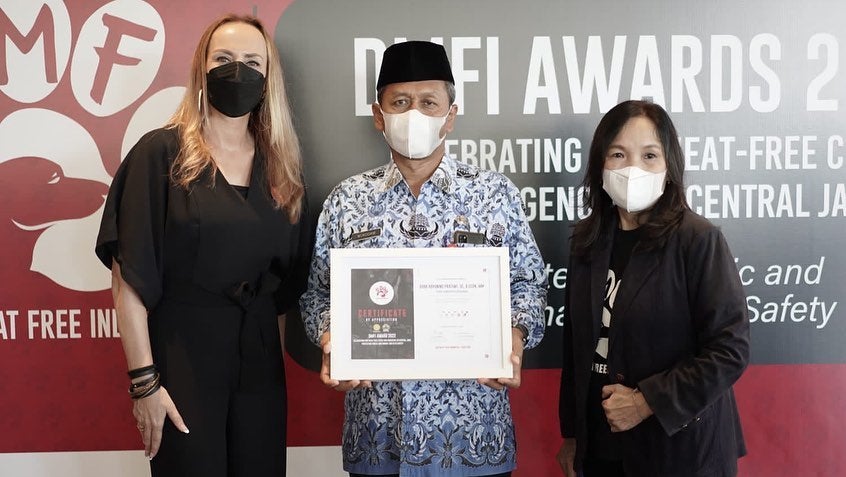
DMFI
With millions of dogs and cats suffering for the meat trade across Asia, rescue alone is not a solution to end this cruel business. However, where we are able to save lives, we and our partners swing into action.
HSI/Korea has rescued more than 2,500 dogs from dog meat farms and markets in South Korea. They have all suffered being intensively bred on farms in small, metal, barren cages with little food or water, left exposed to the harsh elements and with no veterinary care. HSI works with farmers who want to leave the cruel trade behind them, closing down their dog meat farms and flying the dogs to freedom in the United States, Canada and the United Kingdom. Through a network of Shelter and Rescue Partners, the dogs are prepared for adoption into loving homes. They serve as ambassadors to help raise awareness of this issue. Back in South Korea, we work with the farmers to help them move on, either by transitioning to new humane livelihoods such as water delivery or vegetable farming, or in the case of very elderly and infirm farmers, retiring from work. In both cases, permanently closing their dog meat farms saves not only the dogs we rescue at the time but also ends the cycle of suffering by preventing many hundreds more from ever being born into the cruel trade in the future. At the same time, we’re demonstrating to the Korean government that phasing out the industry is a feasible solution.
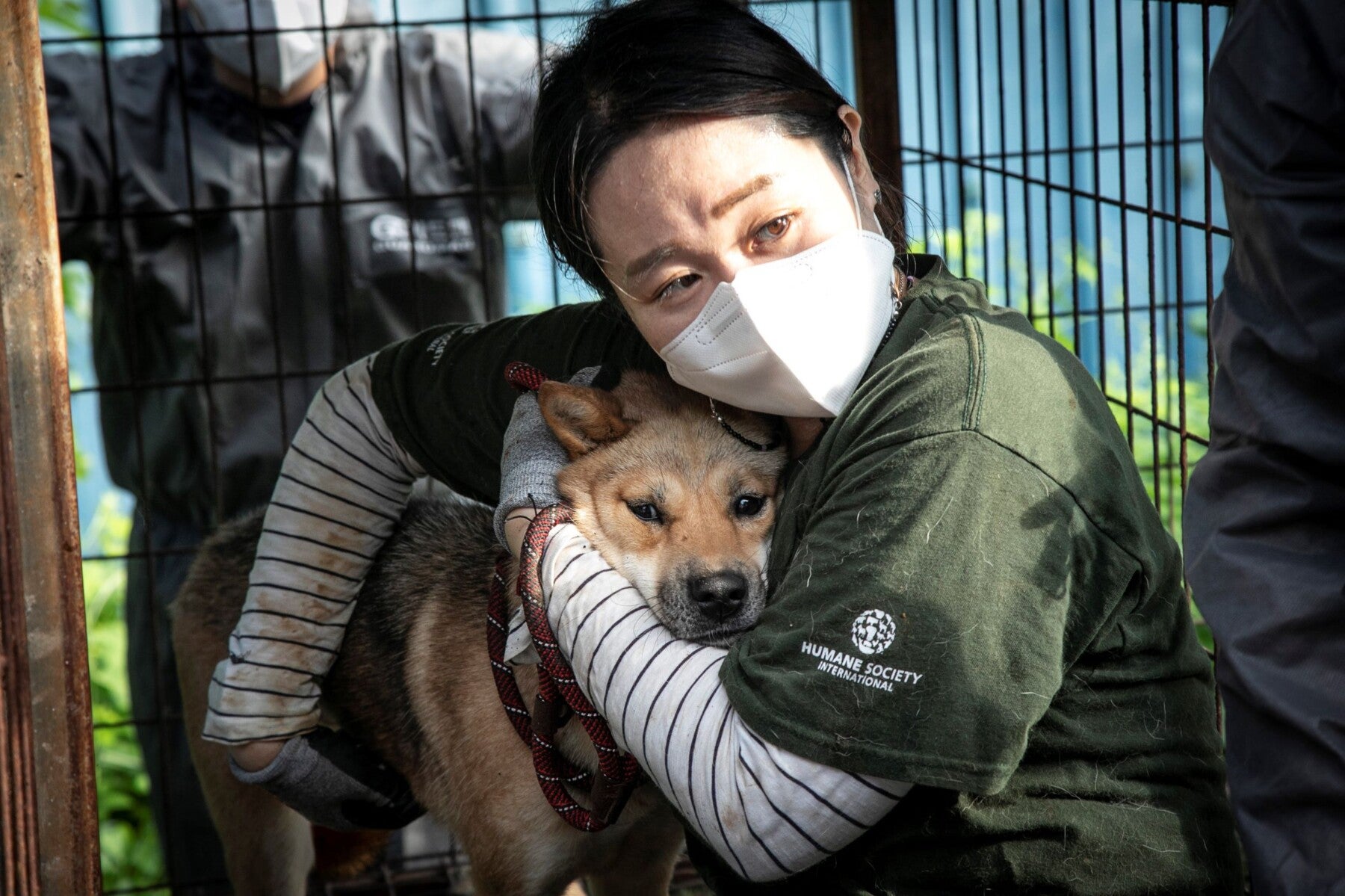
HSI/Jean Chung
In China, HSI supports the work of local groups who liaise with the police to pull over trucks on the highways crammed with dogs and cats on their way to slaughterhouses. As these animals are largely illegally acquired from the streets and their homes, as well as illegally transported across provincial borders without the necessary paperwork, intercepted trucks can be seized by the police and the dogs confiscated. Our partner groups provide immediate lifesaving water and care for the animals who will have been driven for days or even weeks to reach the slaughterhouse. Many of them will be sick from disease, dehydration or heat stroke, or injured with wounds to their paws or even broken bones. Our supporters’ donations have helped bring top-quality veterinary care and safe sanctuary at HSI-funded shelters to these animals so that they can recover and learn to trust again.
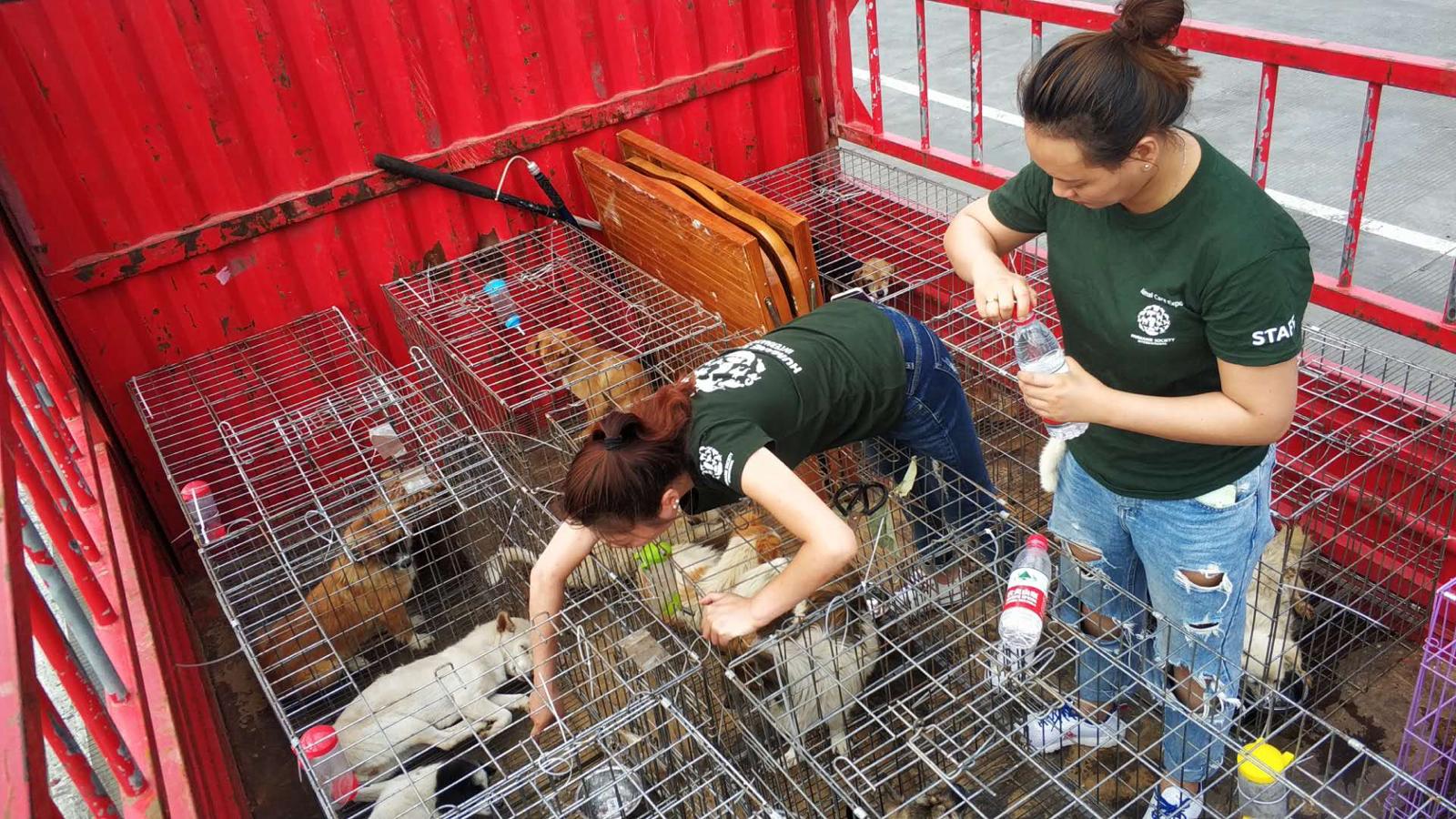
HSI
Criminal activity underpins the dog meat industry across much of Asia, yet convictions are extremely rare. HSI wants to see improved law enforcement as a priority to deter dog traffickers, protect vulnerable animals and increase arrest and conviction rates for dog trade criminals. In Indonesia, more than one million dogs are still illegally stolen, trafficked, slaughtered and sold for human consumption every year. Without a nationwide ban, the relevant laws and regulations that can be applied have weak penalties, and enforcement is rare, which enables the traders to continue to operate. DMFI campaigners work with law enforcement as well as local and regional officials to introduce bans and help the authorities crack down on the criminals. As a direct result of this strategy, we’ve worked with police to intercept trucks smuggling dogs, and seen the country’s first ever convictions for dog traffickers.
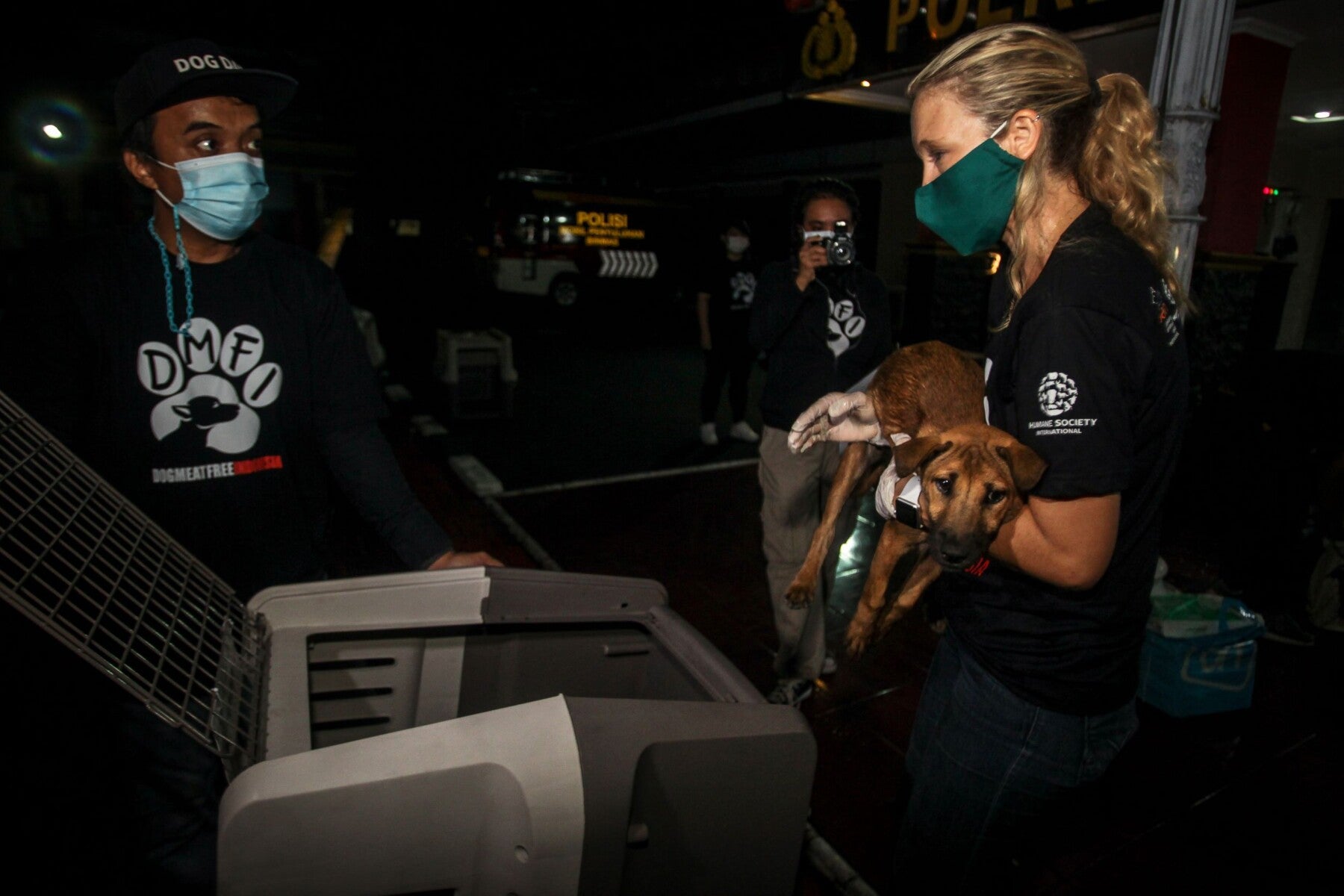
Yoma Times Suryadi/AP Images for HSI
Our work shining a spotlight on the suffering endured by dogs and cats for the meat trade is a powerful tool in changing hearts and minds. In South Korea, our strategy of inviting Korean media to attend our dog farm rescues and witness the conditions first-hand has shone a much-needed spotlight on the cruelty. Showing the grim reality of the industry to the public and politicians has contributed to increased support for a ban. Likewise, in Indonesia our DMFI investigations have exposed the appalling cruelty endured by these animals, including those at markets where they are routinely bludgeoned and blow torched in front of each other. Our investigations result in national and international media headlines, which, in turn, support our campaign work on the ground and increase momentum for change.
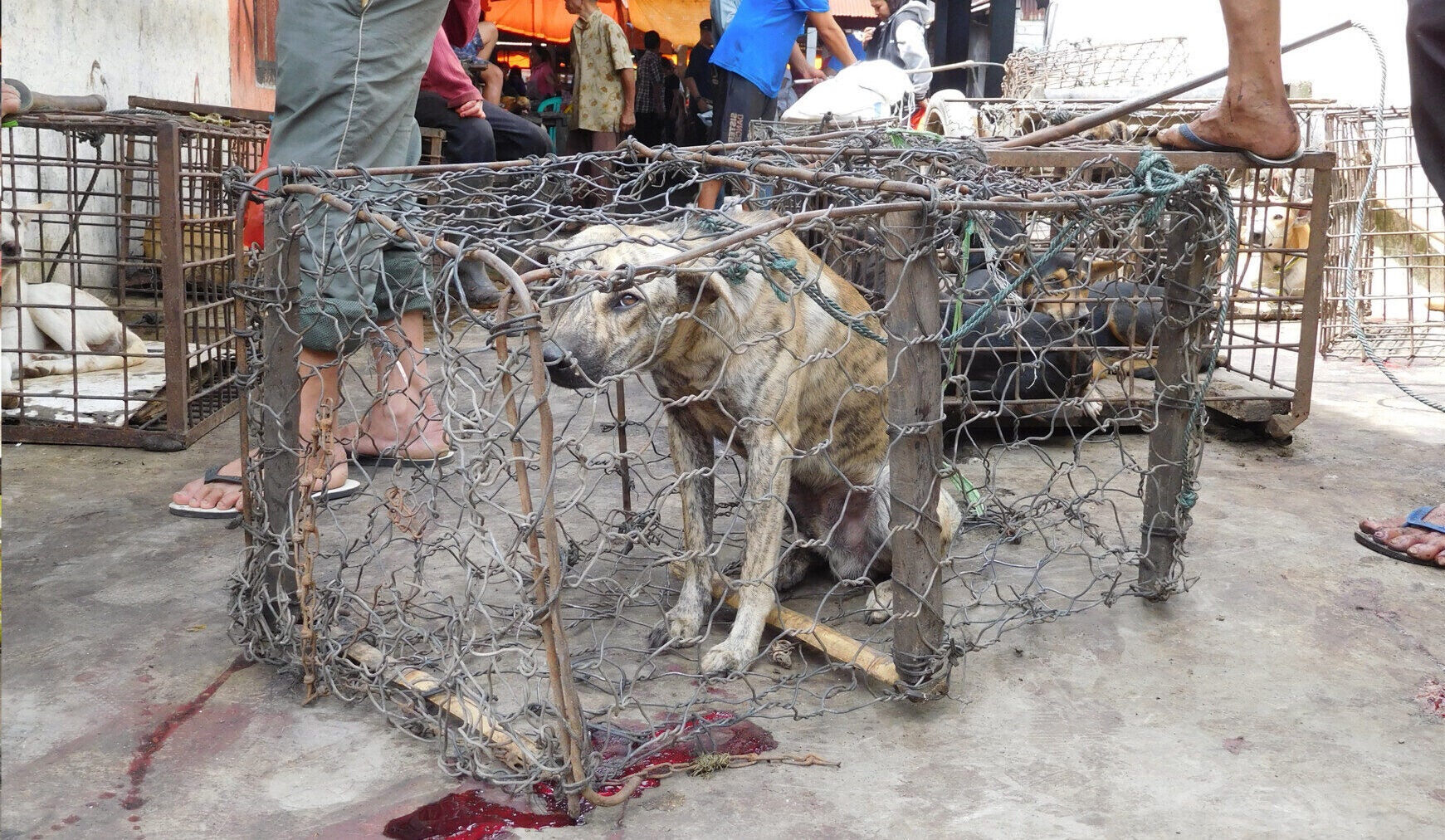
Dog Meat Free Indonesia
Most people across Asia don’t eat dog and cat meat, and do increasingly support an end to the trade, particularly where public campaigning has led to a greater awareness about the cruelty involved. In South Korea and Indonesia, for example, there is dwindling interest in dog meat consumption, particularly among the younger generation who view dogs as companions, not food. Together with our partner groups such, as KARA in South Korea and DMFI in Indonesia, HSI participates in public peaceful demonstrations of support for protecting dogs from this cruelty as well as eye-catching, nationwide PR campaigns. Community outreach and highlighting the special nature of dogs as our companions are also part of our strategy to promote a public insistence for the end of the dog meat trade.
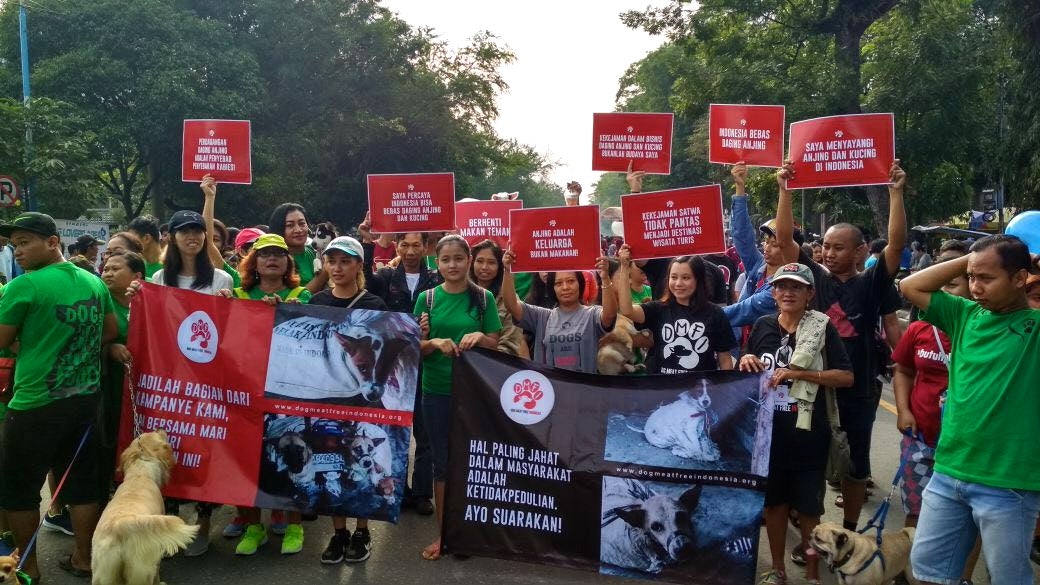
Dog Meat Free Indonesia
HSI’s promise to these animals and our advocates is that we will not rest until the dog meat trade ends. Join us in our fight to stop this and other cruelty. Join us in our fight to stop this and other cruelty.
Humane Society International / Global
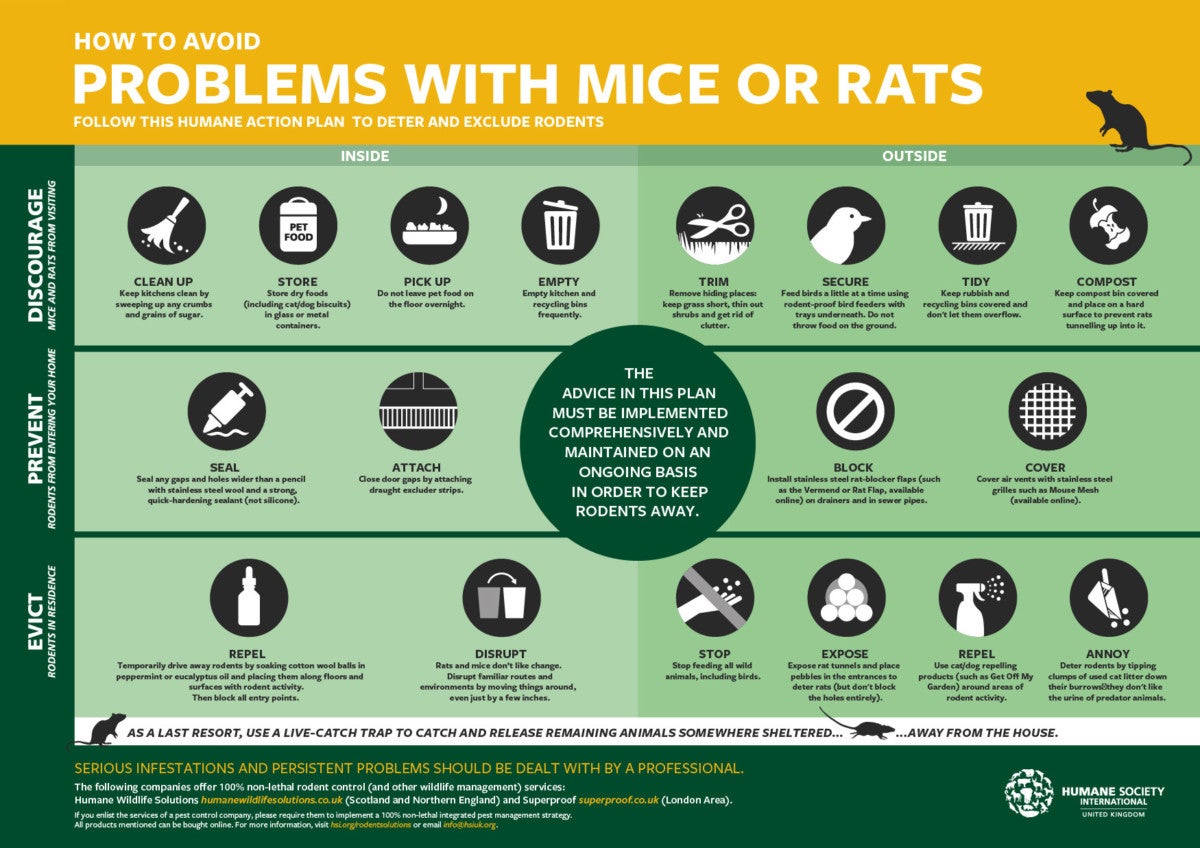
Rats and mice live alongside us, thrive because of us, and survive in spite of our attempts to eradicate them. While they mean us no harm, the presence of unwanted rodent visitors can, at times, undoubtedly cause problems for people, In order to ‘control’ them, a selection of products is available including repellent sprays, ultrasonic devices, poisons and several different types of traps, some lethal and some intended for live release.
HSI advocates that the default solution should be to implement humane methods of deterrence and eviction instead of killing them. This is for two important reasons:
Like all animals, rats and mice require food and shelter and will seek out easily accessible sources of both. Rats prefer to be outside but mice like to live indoors and can enter your home by squeezing through very small spaces, for example air vents, and gaps around gas and water pipes. Prevention is better than cure: seal off holes and don’t tempt mice and rats in with easily accessible food supplies. The food that we throw way in our rubbish or compost bin, leave out for our companion animals and put out for wild animals whose visits we do enjoy, such as hedgehogs and birds, provides rats and mice with a tempting buffet. Many rat ‘infestations’ are the result of bird-feeding.
As soon as a rat or mouse problem is identified, it is important to take swift action. Identify the source of food that attracted them and remove it. Humanely remove the animals and then seal up holes to keep others from gaining entry.
Home and Kitchen:
Please note: Plug-in ultrasonic devices are not reliable.
Lofts, basements and sheds:
Garden:
Unfortunately, unless mice leave of their own volition, even with the best of intentions it is very difficult to deal with them in a way that doesn’t involve some risk for them or their offspring. Catching animals and releasing them away from the home should only be a last resort if you have not been able to encourage them to leave of their own accord. Whilst it is undoubtedly preferable to a slow and certain death from poisoning, there is no guarantee that indoor mice will survive in unfamiliar territory outside if they have been inside for generations, and their chances will be reduced further by cold weather. They may also leave behind young, dependent animals in the nest, who will perish. If you do need to address the situation urgently, either purchase a humane trap (available in some DIY/garden centres and hardware stores) or follow these steps for making a home-made version. Whichever trap you use it must be checked first thing in the morning, last thing at night and at least once more during the day and the animal released as soon as possible.
After animals have been evicted or captured and released, it is vital that they are prevented from re-entering. Determining points of entry from outside to in is especially important.
Humane Society International / Global
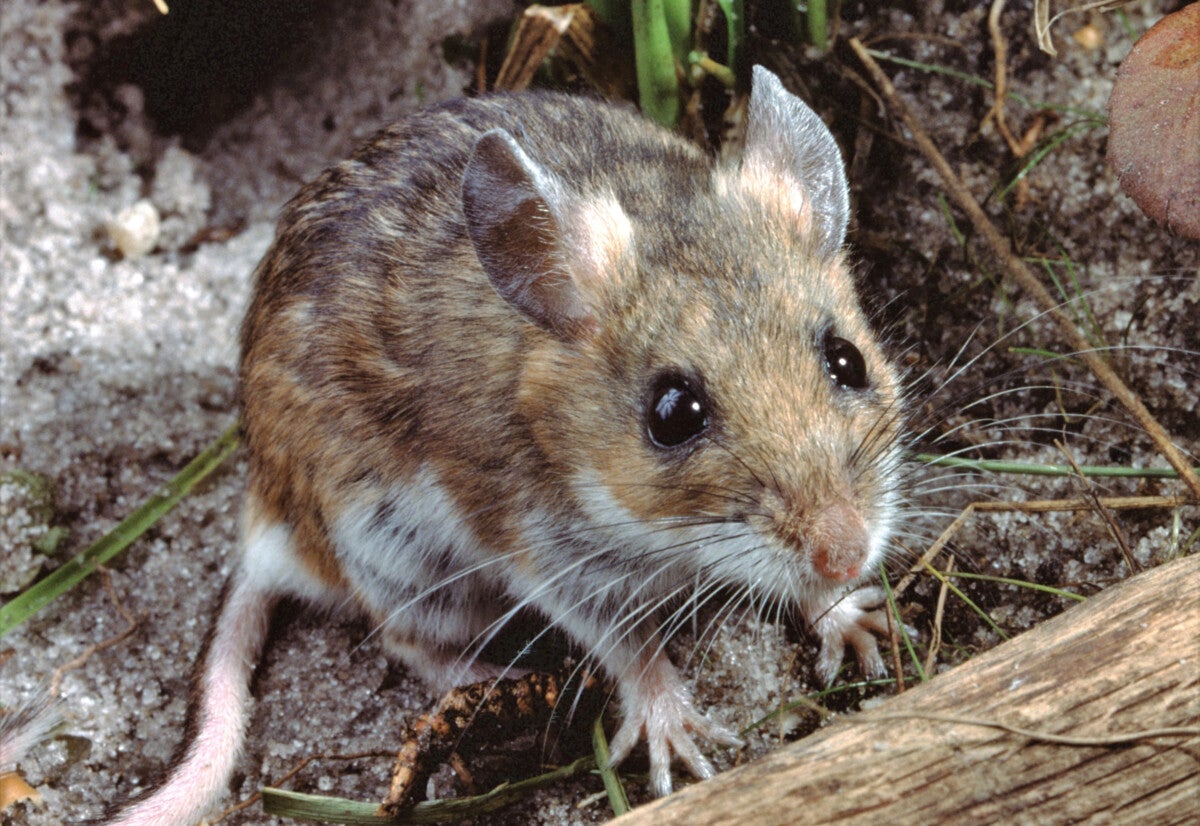
Q: What are glue traps?
A: Glue traps, also known as glue boards, are trays coated with an extremely strong adhesive. Any animal who touches one becomes stuck and is unable to escape.
Q: Do glue traps kill the animals?
A: No. The animal is immobilised but not killed outright.
Q: What happens to animals caught by a glue trap?
A: Depending on how frequently the trap is checked, animals can be stuck anywhere from a hours to days. They may be trapped on their side, or face down, by all legs or just one, and will often cry out in distress. Trapped animals struggle to free themselves and may become more and more embedded in the glue. Some rodents break bones and tear off, or even bite through, their own limbs in an attempt to free themselves. After a fruitless struggle, they may succumb to exhaustion, collapse face down in the glue, and die of suffocation when the glue lodges in their nasal passages. Most often death comes from a combination of exhaustion and dehydration. This can take hours or even days.
Q: Do glue boards pose a risk to other animals?
A: Yes, glue traps are indiscriminate. Although typically used to catch mice and rats, there have been many reported incidents of non-target animals becoming trapped, including protected species like wild birds and bats, hedgehogs, fox cubs and even pet cats. The Scottish Animal Welfare Commission has concluded that there is ‘an undeniable risk of capture of non-target species”.
Q: Are glue boards a risk to humans?
A: Through no fault of their own, rodents are vectors for certain diseases, which are transmitted through their urine and faeces. Panicked animals will defecate and urinate out of stress and fear, meaning anyone handling a glue board with an animal stuck to it could potentially be exposed to disease organisms. The Centers for Disease Control and Prevention (CDC), the leading public health authorities in the US, advise against the use of glue traps for these reasons. Picking up a trap with a live animal stuck to it may also lead to the person’s being bitten.
Q: Where are glue traps banned?
A: In 2022, following advocacy efforts by HSI and other groups, the UK Government prohibited the use of glue traps across England under the Glue Traps (Offences) Act 2022, except for user holding a government-granted licence. Glue traps have already been outlawed in other countries, including Ireland, New Zealand, the Australian state of Victoria and Iceland. While in some countries, these traps remain widely available online as well as in corner shops, DIY and garden centres, hardware stores, the list of countries banning them is growing. The Scottish and Welsh governments have now also announced their intentions to implement a ban.
Q: What should you do if you find a glue trap, or if you have a live animal on a glue board?
A: If you live in England it is an offence to fail to disable a glue trap you have found where there is a risk of it capturing a rodent, without reasonable excuse. In some countries, it is the legal responsibility of the person who laid the trap to kill the animal ‘quickly and humanely’, However, the vast majority of glue trap packaging does not make this clear, nor carry any instructions for how to do it. In fact, our research found that fifty per cent of people wouldn’t know what to do with a live animal attached to a trap, or would deal with it in ways that would cause suffering and even be illegal under some countries’ animal welfare laws.
It is very difficult for untrained individuals to release an animal from a glue board without running the risk of inflicting further injuries, or possibly being injured themselves. Once unstuck, even if an animal appears unharmed, s/he could be injured in ways that aren’t immediately visible, or could need treatment for dehydration or exhaustion.
In all cases, please treat an animal caught on a glue board as an emergency. Here are instructions on how to help an animal caught in a glue trap.
Q: If a mouse or rat is suffering on a glue trap and can’t be released, is there a humane way of killing them?
A: The only method of killing a rodent on a glue trap that is regarded as ‘humane’ is with one sharp blow to the head. However this requires a firm, unwavering resolve and many people may find themselves too frightened, squeamish or upset to be able to do it. Forum users divulging details of what they have done with glue-trapped animals list leaving the animal to die on the trap, drowning the animal or throwing the trap away with a live animal still attached as methods of dispatch, all of which would cause unacceptable suffering.
Q: Is drowning an option?
A: No. The professional pest control industry and scientists agree that drowning is not humane. One experiment found the average time it takes for a rat to drown is 2.6 minutes. Setting an important legal precedent, in 2010 a man was convicted under the UK Animal Welfare Act of causing unnecessary suffering after he drowned a squirrel in a water butt.
Q: Are glue boards an effective long-term method of rodent control?
A: No. These devices may be effective at catching individual, or even a few, animals but they do not provide a long-term solution. Unless the conditions that encouraged the animals to take up residence in the first place are addressed and animals humanely evacuated and prevented from returning, it is highly likely that, over time, others will simply move into the vacated territory.
Q: What should you do if you have mice in the house or rats in the garden?
A: There are non-lethal ways of dealing with unwanted rodent visitors that are not only more humane, but also far more effective in the long-term, too. Read more about humane rodent solutions.